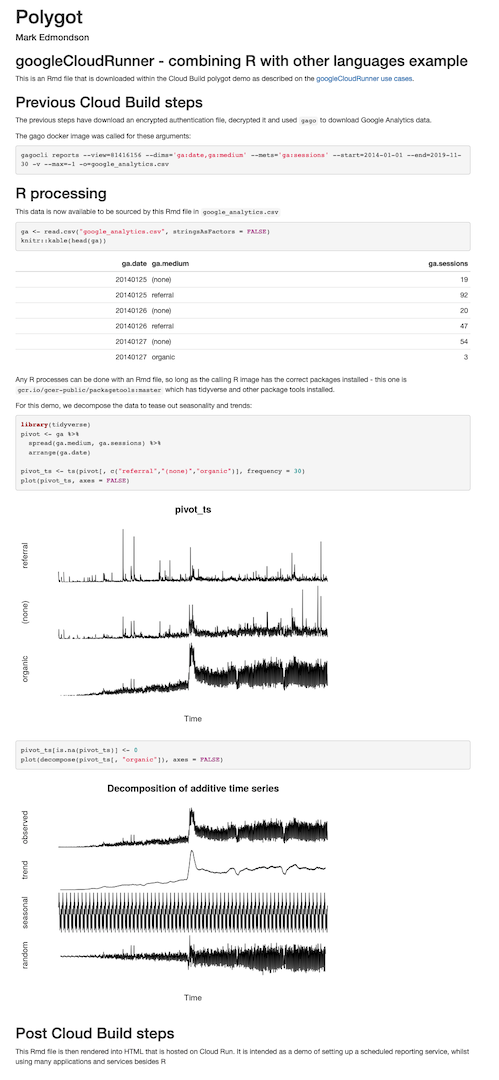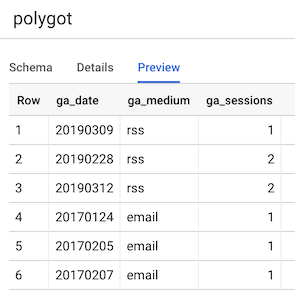GA imports into BigQuery via Polygot Cloud Builds - integrating R code with other languages
2021-03-19
Source:vignettes/usecase-polygot-ga-imports-to-bigquery.Rmd
usecase-polygot-ga-imports-to-bigquery.RmdSince Docker containers can hold any language within them, they offer a universal UI to combine languages. This offers opportunities to extend other languages with R features, and give other languages access to R code without needing to know R.
An example below uses:
-
gcloud- Google’s Cloud command line tool to access Google’s key management store and download an authentication file, and pushes to BigQuery -
gago- A Go package for fast downloads of Google Analytics data -
R- R code to create an Rmd file that will hold interactive forecasts of the Google Analytics data viacr_buildstep_r() -
nginx- serve up the Rmd files rendered into HTML and hosted on Cloud Run viacr_deploy_html()
And will perform downloading unsampled data from Google Analytics, creating a statistical report of the data and then uploading the raw data to BigQuery for further analysis.
library(googleCloudRunner)
polygot <- cr_build_yaml(
steps = c(
cr_buildstep(
id = "download encrypted auth file",
name = "gsutil",
args = c("cp",
"gs://marks-bucket-of-stuff/auth.json.enc",
"/workspace/auth.json.enc"),
),
cr_buildstep_decrypt(
id = "decrypt file",
cipher = "/workspace/auth.json.enc",
plain = "/workspace/auth.json",
keyring = "my-keyring",
key = "ga_auth"
),
cr_buildstep(
id = "download google analytics",
name = "gcr.io/gcer-public/gago:master",
env = c("GAGO_AUTH=/workspace/auth.json"),
args = c("reports",
"--view=81416156",
"--dims=ga:date,ga:medium",
"--mets=ga:sessions",
"--start=2014-01-01",
"--end=2019-11-30",
"--antisample",
"--max=-1",
"-o=google_analytics.csv"),
dir = "build"
),
cr_buildstep(
id = "download Rmd template",
name = "gsutil",
args = c("cp",
"gs://mark-edmondson-public-read/polygot.Rmd",
"/workspace/build/polygot.Rmd")
),
cr_buildstep_r(
id="render rmd",
r = "lapply(list.files('.', pattern = '.Rmd', full.names = TRUE),
rmarkdown::render, output_format = 'html_document')",
name = "gcr.io/gcer-public/packagetools:latest",
dir = "build"
),
cr_buildstep_bash(
id = "setup nginx",
bash_script = system.file("docker", "nginx", "setup.bash",
package = "googleCloudRunner"),
dir = "build"
),
cr_buildstep_docker(
# change to your own container registry
image = "gcr.io/gcer-public/polygot_demo",
tag = "latest",
dir = "build"
),
cr_buildstep_run(
name = "polygot-demo",
image = "gcr.io/gcer-public/polygot_demo",
concurrency = 80),
cr_buildstep(
id = "load BigQuery",
name = "gcr.io/google.com/cloudsdktool/cloud-sdk:alpine",
entrypoint = "bq",
args = c("--location=EU",
"load",
"--autodetect",
"--source_format=CSV",
"test_EU.polygot",
"google_analytics.csv"
),
dir = "build"
)
)
)
# build the polygot cloud build steps
build <- cr_build(polygot)
built <- cr_build_wait(build)An example of the demo output is on this Cloud Run instance URL: https://polygot-demo-ewjogewawq-ew.a.run.app/polygot.html

It also uploads the data to a BigQuery table:

This constructed cloud build can also be used outside of R, by writing out the Cloud Build file via cr_build_write()
# write out to cloudbuild.yaml for other languages
cr_build_write(polygot)
# 2019-12-28 19:15:50> Writing to cloudbuild.yamlThis can then be scheduled as described in Cloud Scheduler section on scheduled cloud builds.
schedule_me <- cr_build_schedule_http(built)
cr_schedule("polygot-example", "15 8 * * *", httpTarget = schedule_me)An example of the cloudbuild.yaml is on GitHub here.